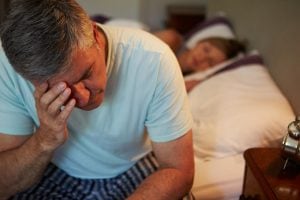You’ve Been Diagnosed with Sleep Apnea, Now What?

In this blog, sleep specialist Dr. Marc Levin of eos dental sleep, explains what to expect after a diagnosis of sleep apnea, including the best sleep apnea treatment options.
What is sleep apnea?
Sleep apnea is a common sleep disorder in which your breathing stops and starts repeatedly as you sleep. It’s most often caused by a partial or complete blockage of your upper airway during sleep.
If you have sleep apnea, you probably snore loudly and may feel excessively sleepy during the day, despite getting the recommended 7 to 9 hours of sleep each night.
What are the dangers associated with sleep apnea?
If left untreated, sleep apnea can be associated with the following dangers and health risks:
- Accidents behind the wheel or at your workplace – Since you’re constantly being woken up throughout the night when your breathing stops, you’ll feel drowsy during the day and may have trouble staying awake, particularly during quiet times. This makes you more prone to having an accident while you’re driving or can make occupational hazards even more hazardous.
- Heart problems or high blood pressure – Your blood oxygen levels can drop abruptly as you sleep, which increases your blood pressure and puts a strain on your cardiovascular system. This puts you at greater risk of having a stroke, heart attack, or irregular heartbeat (arrhythmia).
- Type 2 diabetes – Sleep apnea can keep your body from using insulin properly, which raises your risk of developing type 2 diabetes and can make existing diabetes worse.
- Surgical complications – If you have undiagnosed sleep apnea, it can cause surgical complications because it can affect your breathing, especially if you’re sedated and lying on your back.
What are some common types of sleep apnea treatment?
There are various forms of sleep apnea treatment, which include:
- CPAP – A continuous positive airway pressure machine delivers a steady stream of air into your airway via a mask that’s connected to a hose and a machine. This type of treatment can be very effective in helping to keep your airway open, but many people have trouble using CPAP because they find it to be uncomfortable, noisy, and cumbersome.
- Oral appliances – Patients who find CPAP to be too uncomfortable often have better success using an oral appliance. This type of custom-made device is similar to an orthodontic retainer, and it’s worn only at night. It helps keep your airway open by preventing the tongue and tissues at the back of the throat from collapsing and causing a blockage. It can be used alone or in conjunction with other treatments, such as CPAP.
- Surgery – If non-surgical sleep apnea treatments aren’t effective, surgery may be necessary. It can be performed to correct an underlying structural issue that’s causing your sleep apnea, such as a deviated septum or enlarged tonsils or adenoids.
Why should you seek sleep apnea treatment at eos dental sleep?
Dr. Levin is a member of the American Academy of Dental Sleep Medicine and has been specially trained to treat sleep apnea. Our practice is dedicated to treating snoring and sleep apnea so our patients can get a good night’s sleep and enjoy better health. We realize that not every patient can tolerate CPAP, so we offer oral appliance therapy as an effective alternative sleep apnea treatment option.
If you’ve been diagnosed with sleep apnea and have trouble adjusting to CPAP, make an appointment today with eos dental sleep. We’re committed to helping you get the most effective sleep apnea treatment for your needs.
